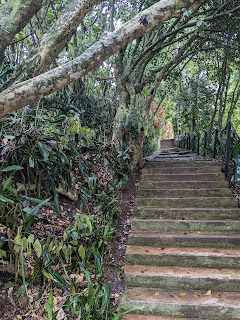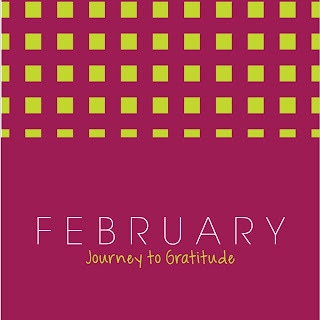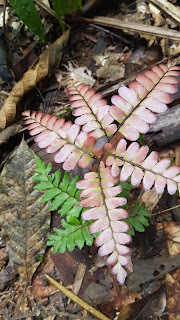Akosua Dardaine Edwards's Blog, page 8
February 15, 2025
Knowing Your Power Also Means Knowing Your Boundaries
we forget that growth starts long before it’s visible. Growthstarts underground. At the root system. And “all of a sudden” happensafter months of invisible work, deep rest, and contemplation. Dr Robin

In a world that often celebrates saying “yes” to every opportunity, there’s an underestimated power in knowing when to say “no.” True empowerment doesn’t come from pleasing everyone or overextending ourselves; it comes from understanding our boundaries and honoring them unapologetically.
Power isn’t just about influence or authority. It’s about having the clarity and courage to define what you will and will not tolerate. It’s about safeguarding your mental and emotional well-being. When you know your boundaries, you reclaim your time, energy, and self-respect.
The Cost of Ignoring BoundariesWhen we constantly say “yes” out of obligation or fear of disappointing others, we slowly chip away at our own strength. We become overwhelmed, exhausted, and sometimes even resentful. Knowing your power means understanding that your well-being comes first. It’s not selfish—it’s essential.
What You Will Say ‘No’ ToTo truly stand in your power, it’s crucial to recognize what you will say “no” to:
Toxic relationships that drain your energy.Unreasonable demands that compromise your mental health.Opportunities that don’t align with your values or long-term goals.Negativity and environments that hinder your growth.What You Will Say ‘Yes’ ToJust as important as knowing when to say “no” is being intentional about your “yes”:
Yes to self-care without guilt.Yes to relationships that uplift and inspire you.Yes to opportunities that challenge and grow you.Yes to rest and reflection because productivity isn’t the only measure of success.Embracing the Power of ChoiceYour power lies in your choices. Every “yes” and “no” is a declaration of your priorities. When you consciously decide what you will and will not allow in your life, you create space for authenticity and fulfillment.
Peace and Blessings
Embrace Your Journey of Transformation with Akosua Dardaine
February 12, 2025
The Magnificence of the Full Moon: A Reminder to Be Present
Let ordinary move you. Let ordinary pull you in as much as the big, booming things. Thoroughly enjoy a green olive. Two green lights in a row. A living room dance party. A good view of the moon. And maybe let yourself be boring sometimes. Let ordinary remind you of what really matters. Danielle La Porte

This morning, as I walked to the boxing gym, earplugs in, lost in the rhythm of my soca classics playlist, I looked up, and there it was—the most magnificent full moon, hanging in the sky like a luminous masterpiece. It was so breathtaking, so awe-inspiring, that I literally screamed in delight. The moon wasn’t just lighting up the sky; it was lighting up *me*. In that moment, I felt an overwhelming sense of connection—to the universe, to myself, and to the beauty of simply being alive.
The full moon has always held a special significance across cultures and time. It’s a symbol of completion, clarity, and illumination. But this morning, it wasn’t just a celestial event; it was a profound reminder of the importance of being present. How often do we rush through our days, heads down, minds cluttered with to-do lists and worries, completely missing the magic unfolding around us? How many beautiful moments slip by unnoticed because we’re too busy, too distracted, or too preoccupied with what’s next?
As I stood there, staring at the moon, I realized how easy it is to miss these moments. If I had been scrolling through my phone, or lost in thought about the grueling workout ahead, I might have walked right past it. But because I was present—because I allowed myself to look up and take in the world around me—I was gifted with a moment of pure wonder.
The full moon, in all its glory, is a call to pause. It’s a reminder that life isn’t just about the destination; it’s about the journey. It’s about the small, unexpected moments that take your breath away. It’s about the way the moonlight can make you feel both insignificant and infinite at the same time. It’s about the way a single moment of awe can shift your entire perspective.
But here’s the thing: we don’t need to overthink what seeing the moon means. It doesn’t have to be a grand metaphor or a cosmic sign. What matters is what we do with the experience. Do we let it inspire us? Do we carry that sense of wonder into our day, into our interactions, into our lives? Do we allow it to remind us to slow down, to look up, to be present? That’s where the magic lies—not in dissecting the moment, but in letting it move us.
The full moon this morning was a gift, a reminder that life is full of these moments—if only we take the time to see them. It was also a reminder to take action from the inspiration.
So, as we move through our days, let’s try to be a little more present. Let’s look up from our screens, our schedules, and our worries. Let’s allow ourselves to be amazed by the world around us. Because the truth is, life is happening right now, in this very moment. And it’s far too beautiful to miss.
Peace and Blessings
Embrace Your Journey of Transformation with Akosua Dardaine
February 8, 2025
Life’s Only Certainty: Change, Death, and the Flow in Between
The next time change feels uncomfortable, ask yourself: Am I resisting because I’m afraid, or because I’m attached to what was? Awareness is the first step.

Life is full of uncertainties, but two things are guaranteed—change and death. Everything else is fluid, unpredictable, and fleeting. For a long time, I resisted this truth. I held on tightly to people, places, and phases of life, wishing things could stay just as they were. But life doesn’t work that way. The more we resist change, the more we suffer. The moment we learn to surrender and flow with it, we find peace.
We like to believe we have control over our lives, but the reality is, we don’t—not in the way we think. We can set goals, make plans, and try to shape our future, but life has its own rhythm. Unexpected events happen, people come and go, and even we, ourselves, change in ways we never anticipated. The truth is, control is an illusion. The tighter we grip, the more we struggle. But when we release that grip—when we trust the flow of life—we experience a sense of freedom.
Change feels uncomfortable because it brings the unknown. Our minds crave stability, familiarity, and certainty. But if we take a step back, we realize that even what feels "stable" today is always shifting in subtle ways. Seasons change, our bodies age, relationships evolve, and the world around us never stays the same.
Instead of fearing change, we can ask: What if change is not the enemy, but the path to growth?
Nature provides the best lessons on change. A river never resists its course—it flows around rocks, adapts to bends, and keeps moving forward. Imagine if the river fought against its own current. It would create nothing but turbulence.
The same applies to life. When we resist, we create struggle. But when we surrender, we find ease. Flowing with change doesn’t mean being passive; it means being adaptable, open, and present in each moment.
One of the biggest lessons I’ve learned is that the more I focus on the present, the less I worry about what’s changing. Life happens now, not in the past or the future. When we fully embrace each moment, we stop clinging to what was or fearing what’s next.
Everything—joy, pain, love, loss—is temporary. But instead of seeing that as something to mourn, we can see it as an invitation to fully experience life while it’s happening.
Change and death are life’s only guarantees. But instead of seeing that as a reason for fear, we can use it as a reminder to truly live. To be present. To stop resisting and start flowing. Because when we embrace change instead of fighting it, we don’t just survive—we thrive.
Peace and Blessings
Embrace Your Journey of Transformation with Akosua DardaineFebruary 6, 2025
Whatever You Have, the Most High Can Use
The Most High is coming through you Michael Beckwith

In a world that often measures worth by grand achievements, shiny accolades, and visible impact, it’s easy to feel like what we have to offer is insignificant. Maybe it’s a talent that feels too small, a dream that seems too far-fetched, or even a thought that feels too simple. We look at ourselves and think, *“This? This is nothing.”* But here’s the truth: whatever you have, the Most High can use.
You see, the value of what we hold isn’t determined by how it looks in our hands but by what it becomes in the hands of the Divine. That idea you’ve been dismissing as too ordinary? It could be the seed of something extraordinary. That skill you think is too basic? It could be the very thing someone else needs. That quiet thought you’ve been carrying in your heart? It could be the answer to a prayer you didn’t even know was being whispered.
The key lies in how we see what we’ve been given. It’s not about the size of the gift but the willingness to offer it. It’s about trust—trusting that even when we can’t see the full picture, the Most High is weaving something beautiful. It’s about belief—believing that what we have, no matter how small, has purpose. It’s about courage—stepping forward even when we feel inadequate. And it’s about being still—letting go of the need to control the outcome and allowing the Divine to work in ways we may never fully understand.
So, whatever you have—your ideas, your thoughts, your talents, your dreams—don’t discount them. Don’t hide them away because they feel insignificant. Offer them up. Trust that the Most High can take what seems like nothing and turn it into something beyond your wildest imagination.
Be still. Believe. Have courage. And watch how the smallest offerings can become the greatest blessings.
Whatever you have, the Most High can use. And that, my friend, is everything.
Peace and Blessings
Embrace Your Journey of Transformation with Akosua DardaineFebruary 4, 2025
Life’s Tests Are Not a Sign of Abandonment—They’re a Call to Rise
Don't be discouraged when you are being tested. Don't register when you are being tested that there is something "wrong" or that you are being abandoned. Now its time to step it up, to act like you know Rev Deborah Johnson

Life has a way of throwing curveballs when we least expect them. Whether it’s a sudden setback, a challenging relationship, a career hurdle, or an internal struggle, these moments can feel like tests. And in those moments, it’s easy to feel discouraged, to wonder if we’ve done something wrong, or even to feel as though we’ve been abandoned by the universe, God, or whatever higher power we believe in. But what if these tests aren’t a sign of abandonment? What if they’re actually an invitation to step up, to grow, and to prove to ourselves just how capable we are?
The Misconception of Abandonment
When life gets tough, it’s natural to feel alone. We might ask ourselves, “Why is this happening to me?” or “Why does it feel like I’m being left to figure this out on my own?” These questions stem from a deep-seated fear of abandonment, a fear that we’re not supported or loved. But the truth is, life’s tests are not evidence of abandonment. They are evidence of trust.
Think about it: when a teacher gives a student a difficult exam, it’s not because they want to see the student fail. It’s because they believe the student is capable of passing. Similarly, life’s challenges are not designed to break us; they are designed to build us. They are a sign that the universe (or whatever force you believe in) trusts us to handle what’s being thrown our way.
The Purpose of the Test
Every test in life serves a purpose. It might be to teach us patience, resilience, or humility. It might be to push us out of our comfort zones and into a space where we can discover strengths we didn’t know we had. Or it might be to remind us of our priorities and values, helping us realign with what truly matters.
When we shift our perspective and see challenges as opportunities for growth, we stop resisting them and start embracing them. Instead of asking, “Why is this happening to me?” we can ask, “What is this trying to teach me?” This simple shift in mindset can transform our experience of hardship from one of despair to one of empowerment.
This doesn’t mean we won’t feel fear or doubt. It simply means we won’t let those feelings stop us. We’ll acknowledge them, learn from them, and keep moving forward.
So the next time you find yourself in the midst of a challenge, remember: this is not the universe turning its back on you. This is the universe believing in you. It’s time to step it up, to act like you know, and to show yourself just how strong you truly are.
Because you are stronger than you think, wiser than you know, and more capable than you realize. And this test? It’s just another opportunity to prove it to yourself.
Peace and Blessings
Embrace Your Journey of Transformation with Akosua DardaineFebruary 1, 2025
Journey to Gratitude: Why Settling Isn’t the Same as Being Grateful
Practice gratitude. Practice it daily. Name and give thanks forthe blessings that hold up your life, the blessings you receive, the blessingsyou offer your world. Hiro Boga

The Illusion of Settling
Have you ever convinced yourself that settling was gratitude? I have. There was a time in my life when I stayed in a job that drained me, telling myself, “I should be grateful to even have a job.” I called it gratitude, but deep down, I knew I was just settling. I was making something work because I was too afraid to admit it wasn’t what I wanted. Same with relationships, I stayed in the thorns and called it roses - I was thankful to have a relationship.
Gratitude is not about resignation or forcing yourself to be okay with less than you deserve. It’s not about plastering a smile on your face and pretending everything is fine when it’s not. True gratitude is a devotion—a courageous, intentional practice that requires us to dig deeper, to know ourselves, and to embrace both the light and the shadows of our lives.
As we step into February, I’m ready to explore what it means to live a life of genuine gratitude—one that doesn’t settle but instead empowers and transforms. Let’s do this.
Gratitude as a Devotion
Gratitude isn’t a one-time act or a fleeting feeling. It’s a devotion—a daily practice of choosing to see the good, even when the good feels buried under layers of frustration, disappointment, or fear. It’s about showing up, day after day, and saying, “I will find something to be thankful for, even here.”
I remember a time when I was stuck in a rut, feeling like my life was on autopilot. My friend recognized my frustration and as fate would have it gifted me with a gratitude journal. I started writing in it daily giving thanks for the now- what was in front of me and for the later - giving gratitude in advance. It has become a daily ritual that I practice- this devotion and ritual rewired my brain to come out of denial and find the good . At first, it felt forced. “I’m grateful for my morning watermelon,” I’d write, half-heartedly. But over time, something changed. I began to notice the small, beautiful moments I had been overlooking—the way the sunlight streamed through my window in the morning, the way the parrots would migrate daily with a ruckus. Gratitude became less about the big things and more about the tiny, sacred details.
The Courage to Be Grateful
Let’s be honest: gratitude isn’t always easy. It takes courage to be grateful, especially when life feels heavy or unfair. It’s easier to complain, to resist, to dwell on what’s wrong. But gratitude asks us to do something radical—to look for the light, even in the darkest places.
I think of a friend who lost her mother last year. In the midst of her grief, she shared something that stayed with me: “I’m not grateful for the loss, but I am grateful for the love we shared. That love is still here, even though she’s not.” Her words reminded me that gratitude doesn’t erase pain; it walks alongside it. It takes courage to hold both the sorrow and the gratitude in the same hand, but when we do, we find a deeper sense of peace.
Knowing Yourself to Be Grateful
Gratitude requires self-awareness. You have to know what you value, what you need, and what you’re willing to accept. Without this knowing, it’s easy to confuse gratitude with settling. I’ve been there—staying in relationships that didn’t serve me, sticking with habits that held me back, all while telling myself, “I should be grateful for what I have.”
But here’s the truth: gratitude isn’t about lowering your standards or silencing your desires. It’s about honoring your truth while finding ways to appreciate where you are. It’s about saying, “This isn’t perfect, but there’s still beauty here.” When we know ourselves, we can discern the difference between settling and genuine gratitude.
Surrender and Acceptance
Gratitude often requires surrender—not the kind of surrender that gives up, but the kind that lets go. It’s about releasing the need to control everything and accepting what is. This doesn’t mean we stop striving for better; it means we find peace in the present moment, even as we work toward our dreams.
I learned this lesson during a season of uncertainty in my career. I had big plans, but nothing was working out the way I’d hoped. Instead of fighting against the uncertainty, I decided to surrender—to trust that things would unfold as they were meant to. In that surrender, I found gratitude for the lessons I was learning, the resilience I was building, and the unexpected opportunities that came my way.
Gratitude Is Not Settling
Here’s the heart of it: gratitude is not about settling for less than you deserve or want. It’s not about staying in situations that dim your light or shrink your spirit. True gratitude empowers us to see the good in our lives while still striving for more. It’s a balance of appreciation and aspiration.
As we move into February, I’m committing to a gratitude that doesn’t settle. I’m choosing to be thankful for where I am while still reaching for where I want to be. I’m choosing to see the beauty in the journey, even when the path is unclear.
Let’s Do This
So, what about you? Are you ready to embark on this journey to gratitude? Are you willing to look beyond the surface and find the courage, self-awareness, and surrender that true gratitude requires? Let’s step into February with open hearts and a commitment to a gratitude that doesn’t settle—a gratitude that empowers, uplifts, and transforms.
What will you choose—gratitude or settling? Let’s do this.
Peace and Blessings
January 27, 2025
The Transformative Power of Humility
Having the humility to admit there is room for improvement and to act on that with self-development is one of the most beautiful aspects of character that a human being can have. Yung Pueblo
We've all been there—holding on to a belief or standing firm in an argument, only to later realize we were wrong. Admitting it can be tough, but it's one of the most liberating things we can do. This is where humility comes in, it keeps us grounded and growing.
Contrary to what many might think, admitting you're wrong doesn't make you weak. In fact, it takes a great deal of strength and courage to openly acknowledge a mistake. This act of vulnerability can lead to greater self-awareness and open the door to personal development. When we recognize and own up to our errors, we're more likely to learn from them and avoid repeating the same mistakes in the future.
Self-reflection is key to self-improvement. By admitting our mistakes, we create opportunities for growth and learning. It forces us to reflect on our actions and thought processes, paving the way for better decision-making in the future. This continuous process of learning from our mistakes helps us become more empathetic, patient, and understanding individuals.
At the end of the day, none of us are perfect. Embracing our imperfections and being open about them is what makes us human. It allows us to connect on a deeper level with others and lead more authentic lives. When we let go of the need to always be right, we open ourselves up to new experiences, perspectives, and opportunities for growth.
Admitting when we're wrong is a powerful act of humility that can transform our lives in countless ways. It strengthens our relationships, promotes personal growth, and enhances communication. So, the next time you find yourself in the wrong, take a deep breath, own up to it, and watch as this simple act paves the way for a richer and more fulfilling life.
-Peace and Blessings
Still Time to Download Free Workbook until 31st January
January 24, 2025
Is It Fear of Confrontation or the Illusion of Kindness?
But in 2025, let’s take a different path—one rooted in humility, courage, and the transformative power of doing our emotional and healing work. Don’t cheat or betray yourself by taking what feels like the easy way out. Dr Robin Smith

Confessions on the journey -the mere thought of addressing uncomfortable truths feels like torture, it scares me to no end. It’s easier to stay quiet, to let things slide, to avoid rocking the boat. I tell myself that silence is the kinder path—that it spares feelings, prevents conflict, and maintains peace. But is that really true? Or am I simply convincing ourselves of a narrative that avoids the discomfort of honesty?
On the surface, staying quiet may seem like an act of compassion. After all, why bring up an issue if it’s only going to hurt someone? But beneath this veneer of kindness often lies fear: fear of confrontation, fear of being disliked, fear of making a situation worse. In the moment, silence feels safer. It allows us to avoid the messy, unpredictable outcomes of addressing difficult truths. Yet this safety is often an illusion, and the consequences of staying quiet can be far-reaching and deeply damaging.
While silence may keep the peace temporarily, it often comes at a high cost. Avoiding difficult conversations can lead to misunderstandings, unaddressed issues, and festering resentment. A partner may not know they’ve hurt you. A colleague might continue a pattern of behavior that undermines your work. A friend could misinterpret your silence as indifference.
Ironically, the very peace we hope to preserve with our quietness can be shattered in the long run. When the truth finally surfaces—as it often does—it can feel like a betrayal. The other party may wonder why you didn’t speak up sooner, and the relationship may suffer irreparable harm.
Honesty, though uncomfortable, is a gift. It allows us to live authentically, build stronger relationships, and create a foundation of trust.
The next time you’re tempted to stay silent, ask yourself: Am I being kind, or am I avoiding discomfort? The answer could lead to a truth that sets you—and others—free.
Peace and Blessings
Still Time to Download Free Workbook until 31st January
A Year of Character, A Year of Possibilities
January 21, 2025
This is not a "giving up" Surrender
My life feels more peaceful, more dignified, more lovely than ever before. Elizabeth Gilbert

I had this belief that once I do everything "right" that life would be kind to me, no problems, no stress. Do it right and pray. Of course, life demonstrated otherwise. It took me a minute to understand that life's events are not personal. its universal and intimate. Everyone will encounter experiences that challenge them to grow, to learn, to accept, to surrender. No one is exempt from the experiences of life.
What we can do however is have the willingness to accept that life will throw us some curve balls and be prepared to face them with courage. We can remember to tell the truth, first to ourselves We can remember to take responsibility for our actions and for remembering that we are built for life. The moment we forget, deny, doubt we get into all sorts of trouble.
The peace comes from the surrender - and this is not a "giving up" surrender, its an unconditional and unwavering faith that once I do the work - the inner work- I will be ok.
Peace and Blessings
Still Time to Download Free Workbook until 31st January
A Year of Character, A Year of Possibilities
January 18, 2025
Resisting and Its Impact
Resisting manifests in many forms including a tendencyto reject, refuse, insult, separate, push away, or remove ourselves from asituation. Resisting leads to estrangement, animosity, dread, and fearfulness.Resisting is the underlying cause of anger, hatred and violence.
R Resistance is not always obvious. It can appear as a simple act of rejection—saying "no" to a proposal or refusing to engage with an idea. At other times, it takes the form of anger or hostility, expressed through insults, pushing others away, or cutting ties entirely. Whether it’s separating ourselves from uncomfortable conversations, avoiding accountability, or rejecting differing viewpoints, resistance often masks itself as self-preservation.
On a deeper level, resistance can emerge from fear—fear of the unknown, fear of change, or fear of vulnerability. These fears manifest in behaviors that isolate us from others and reinforce our biases. We push away what we don’t understand, creating an "us versus them" dynamic that breeds animosity and alienation.
I I have been paying attention to how resistance shows up for me, in the behaviors I exhibit, in how I show up, or not show up. Resistance rears its head in my life when I feel unsafe ( and sometimes that feeling is not real, its triggered by an event), when I feel like I m losing, going to be abandoned or I find the truth scary. I procrastinate, I judge myself and others, I write people off and out of my life.
The antidote to resistance is acceptance. This does not mean passive submission or agreeing to everything we encounter, but rather approaching situations with openness and a willingness to understand. Acceptance allows us to face challenges without fear, to engage with differing perspectives without hostility, and to find common ground in the face of division. Byron Katie's work has taught me so much about acceptance. She says when you resist reality you suffer. Loving what is brings a level of peace that passes all understanding. This is a process and takes not only a firm decision and commitment but also a level of trust in Self.
Practicing mindfulness can be a powerful tool in overcoming resistance. By observing our thoughts and emotions without judgment, we can identify moments where resistance arises and choose more constructive responses. Empathy is another key—by seeking to understand others’ experiences and motivations, we dismantle the barriers that resistance builds.
Still Time to Download Free Workbook until 31st January
A Year of Character, A Year of Possibilities



